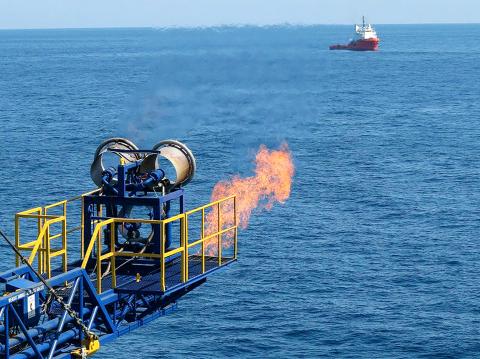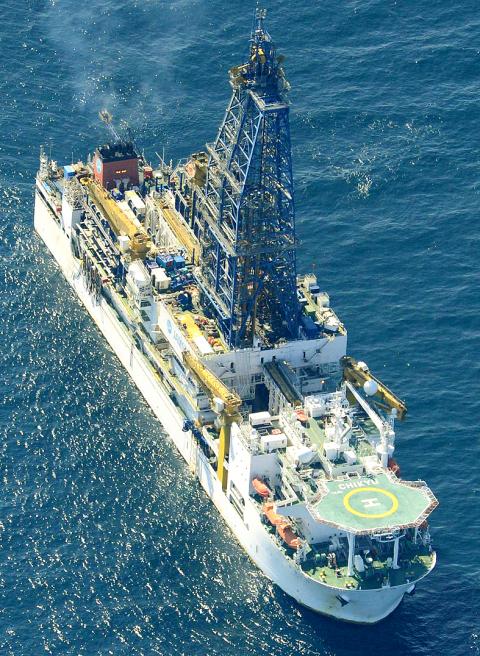Japan yesterday said it had successfully extracted methane hydrate, known as “fire ice,” from its seabed, possibly unlocking many years’ worth of gas for the resource-starved country.
In what they are claiming as a world first, a consortium is drilling for the hydrate, a fossil fuel that looks like ice, but consists of very densely packed methane surrounded by water molecules and sits 1km below sea level.
The solid white substance burns with a pale flame, leaving nothing but water. One cubic meter of it is estimated to contain many times the equivalent volume of methane in gas form.

Photo: EPA
The consortium, led by Japan Oil, Gas and Metals National Corp, began initial work in February last year and started a two-week experimental production yesterday, a Japanese Ministry of Economy, Trade and Industry official said.
“It is the world’s first offshore experiment producing gas from methane hydrate,” the official said, adding that the team successfully collected methane gas extracted from the half-frozen substance.
Under the project, the consortium is to separate methane — the primary component of natural gas — from the solid clathrate compound under the seabed using the high pressures available in the deep, officials said.

Photo: Reuters / KYODO
A huge layer of methane hydrate containing 1.1 trillion cubic meters in natural gas — equivalent to Japan’s consumption of the gas for 11 years — is believed to lie in the ocean floor off the coast of Shikoku Island, western Japan, the officials said.
“We aim to establish methane hydrate production technologies for practical use by the fiscal 2018 year” ending on March 2019, a consortium official said.
The move comes as resource-poor Japan has struck out in search of new energy supplies after it shut down its nuclear reactors in the wake of the crisis at the Fukushima Dai-ichi nuclear power plant two years ago.
Japan switched off its atomic reactors for safety checks following the disaster, which saw a wall of water hit the nuclear plant, crippling its cooling systems and sending reactors into meltdown.
Only two of Japan’s 50 reactors are now operational, with more stringent safety standards and political nervousness following in the wake of the worst nuclear accident since Chernobyl in 1986.

RUN IT BACK: A succesful first project working with hyperscalers to design chips encouraged MediaTek to start a second project, aiming to hit stride in 2028 MediaTek Inc (聯發科), the world’s biggest smartphone chip supplier, yesterday said it is engaging a second hyperscaler to help design artificial intelligence (AI) accelerators used in data centers following a similar project expected to generate revenue streams soon. The first AI accelerator project is to bring in US$1 billion revenue next year and several billion US dollars more in 2027, MediaTek chief executive officer Rick Tsai (蔡力行) told a virtual investor conference yesterday. The second AI accelerator project is expected to contribute to revenue beginning in 2028, Tsai said. MediaTek yesterday raised its revenue forecast for the global AI accelerator used

TEMPORARY TRUCE: China has made concessions to ease rare earth trade controls, among others, while Washington holds fire on a 100% tariff on all Chinese goods China is effectively suspending implementation of additional export controls on rare earth metals and terminating investigations targeting US companies in the semiconductor supply chain, the White House announced. The White House on Saturday issued a fact sheet outlining some details of the trade pact agreed to earlier in the week by US President Donald Trump and Chinese President Xi Jinping (習近平) that aimed to ease tensions between the world’s two largest economies. Under the deal, China is to issue general licenses valid for exports of rare earths, gallium, germanium, antimony and graphite “for the benefit of US end users and their suppliers

Dutch chipmaker Nexperia BV’s China unit yesterday said that it had established sufficient inventories of finished goods and works-in-progress, and that its supply chain remained secure and stable after its parent halted wafer supplies. The Dutch company suspended supplies of wafers to its Chinese assembly plant a week ago, calling it “a direct consequence of the local management’s recent failure to comply with the agreed contractual payment terms,” Reuters reported on Friday last week. Its China unit called Nexperia’s suspension “unilateral” and “extremely irresponsible,” adding that the Dutch parent’s claim about contractual payment was “misleading and highly deceptive,” according to a statement

Artificial intelligence (AI) giant Nvidia Corp’s most advanced chips would be reserved for US companies and kept out of China and other countries, US President Donald Trump said. During an interview that aired on Sunday on CBS’ 60 Minutes program and in comments to reporters aboard Air Force One, Trump said only US customers should have access to the top-end Blackwell chips offered by Nvidia, the world’s most valuable company by market capitalization. “The most advanced, we will not let anybody have them other than the United States,” he told CBS, echoing remarks made earlier to reporters as he returned to Washington